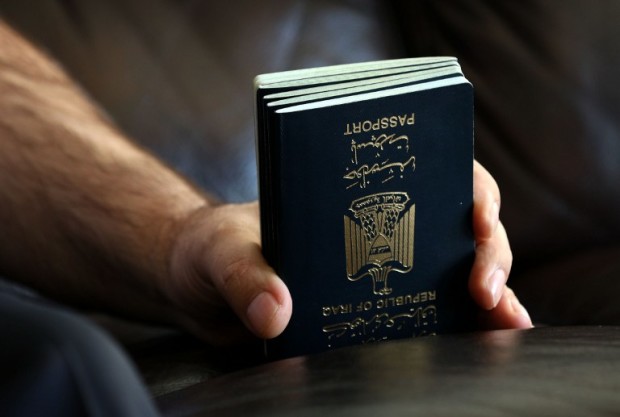Dissident US diplomats defy Trump on travel ban

Fuad Sharif Suleman holds the passport of his family members in Arbil, the capital of the Kurdish autonomous region in northern Iraq, on Jan. 30, 2017 after returning to Iraq from Egypt, where him and his family were prevented from boarding a plane to the US following US President Donald Trump’s decision to temporarily bar travellers from seven countries, including Iraq. AFP
WASHINGTON, United States — A group of US diplomats declared their opposition to President Donald Trump’s travel ban Tuesday, despite the White House warning that they should get behind his agenda or resign.
A large group of diplomats from posts around the world submitted a “dissent memo” through an official State Department channel, a spokeswoman confirmed.
When it was reported on Monday that such a memo was being prepared, Trump’s spokesman Sean Spicer issued an extraordinary warning that the officials “should either get with the program or they can go.”
Trump’s White House argues that the ban is necessary to slow arrivals from countries plagued by violent extremism while his administration draws up tough new rules to weed out potential terrorists.
“If somebody has a problem with that agenda, that does call into question whether they should continue in that post or not,” Spicer told reporters. “This is about the safety of America.”
Article continues after this advertisementAccording to leaked drafts of the memo, the US envoys argue that Trump’s decision to suspend refugee arrivals and ban visitors from seven mainly-Muslim countries is a betrayal of American values.
Article continues after this advertisement“We are better than this ban,” they declare, scorning Trump’s plan to introduce “extreme vetting” for visa applicants as a “high, vague and nebulous bar” for travelers from the seven countries to meet.
“A policy which closes our doors to over 200 million legitimate travelers in the hopes of preventing a small number of travelers who intend to harm Americans from using the visa system to enter the United States will not achieve its aim of making our country safer,” the memo reads.
Trump’s order bans the arrival of citizens from Iran, Iraq, Libya, Somalia, Sudan, Syria and Yemen for at least 90 days. All refugees are barred for 120 days, while Syrian refugees are blocked indefinitely.
The order triggered mass protests at US airports, as arriving refugees and travelers from the targeted countries were turned away, and stoked outrage around the globe.
The State Department’s internal “dissent channel” was created during the Vietnam War. The last time it was used was in June 2016, when about 50 diplomats urged president Barack Obama to reconsider his opposition to US military strikes against Syria.
But its use just 10 days after a new president was inaugurated — and even before Trump’s nominee for secretary of state has been confirmed — is unprecedented. CBB